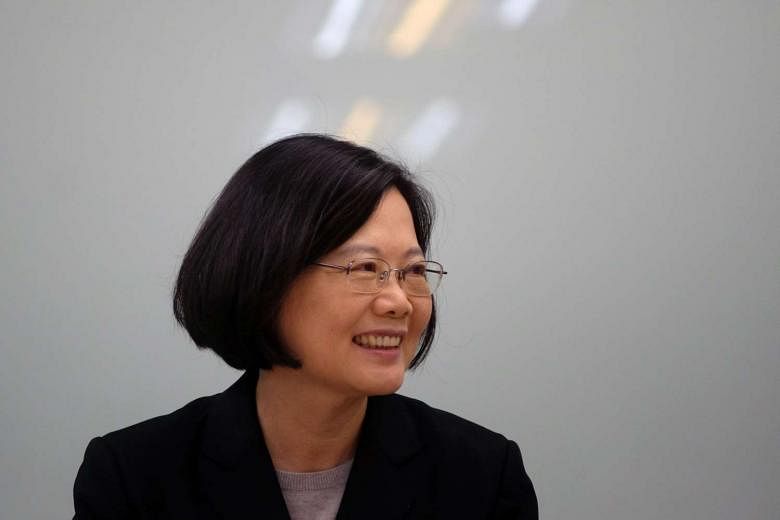TAIPEI (REUTERS) - Taiwan's new ruling party is set for an early clash with China over the first major item on its legislative agenda - a bill that could paralyse trade between the two rivals and which Beijing has already condemned.
The proposed "supervision law" has not only angered China, which views self-ruled Taiwan as a breakaway province, but sent shivers through the island's business community which thinks the government should put the economy before politics.
Incoming president Tsai Ing-wen has made the bill, spurred by anti-China student protests in 2014, a priority for her government, which will be sworn in on Friday (May 20).
The bill requires government officials to get legislative consent before, during and after any talks with Beijing. They cannot sign any agreements with China before all three stages of legislative approval are completed.
"We are very worried," said Liao Wan-lung, head of Taiwan's Council for Industrial and Commercial Development. "It will be a major blow to the growth of Taiwan's fragile economy."
Tsai's Democratic Progressive Party (DPP) won parliamentary and presidential elections by a landslide in January in a voter backlash against a trade pact with China that the previous Nationalist government had sought to push through.
The independence-leaning DPP is distrustful of growing economic dependence on China and Chinese cultural influence. Supporters of the bill say it will add transparency to negotiations.
Economic ties warmed considerably when Ma Ying-jeou of the Nationalists was elected president in 2008, ushering in regular high-level exchanges and overseeing landmark economic deals.
Critics of bill say it will stall, rather than ease, the relationship with the world's second-largest economy. A spokesman for China's top agency in charge of handling Taiwan affairs said in March that anything that "puts up man-made blocks" on ties with Taiwan would be absolutely opposed.
Liao and other business leaders fear the DPP is prioritising sovereignty at the expense of trade.
CHINA DEEPLY DISTRUSTFUL OF DPP
The bill governs all matters related to China, Taiwan's biggest export market. Taiwan's trade-reliant economy is struggling to shake off last year's recession as prolonged weakness in global demand weighs on Asian exporters.
Communist Party leaders in Beijing have not ruled out using force to bring democratic Taiwan under their control. They are deeply distrustful of the DPP, whose charter includes a clause promoting "a sovereign and independent Republic of Taiwan". Tsai however has stressed she intends to "maintain the status quo"with China.
The DPP considers the supervision bill a purely domestic matter. "We cannot draft this law according to the way China wants things to be," said Wu Ping-jui, a legislative leader of the DPP. "... President Tsai has said she will maintain the status quo. What that means for the DPP is that Taiwan has independent sovereignty and is not to be controlled by China."
The Nationalists, who fled to Taiwan after losing the Chinese civil war to the Communists in 1949, have made their stance clear.
"The law will cripple relations with China," said MP Lai Shyh-bao. "We will not endorse it."
The bill describes Taiwan-China ties as "cross-strait", referring to the stretch of water between the two sides, rather than "country to country", which some point to as a goodwill gesture to China.
"But it will never be enough for China no matter how many good gestures Tsai makes," said Lin Ting-hui, vice president of the Taiwan Brain Trust, a pro-independence think tank in Taipei. "Taiwan must strengthen its own hand until it has enough chips to negotiate with China."

